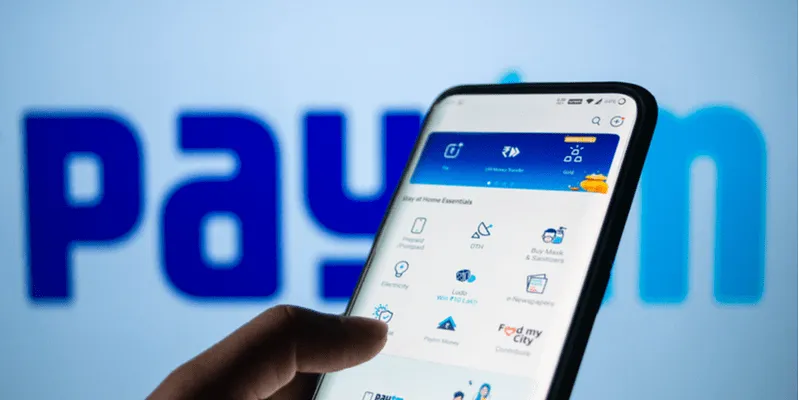Paytm IPO roadmap: 15 things to know about fintech giant’s DRHP filing
From financial metrics to future growth strategies, here’s a look at some key takeaways from the DRHP for the Rs 16,600 crore IPO.
Vijay Shekhar Sharma-led One97 Communications, the parent company of , recently filed the Draft Red Herring Prospectus (DRHP) for an initial public offering (IPO) of Rs 16,600 crore ($2.2 billion).
The total issue size consists of a fresh issue of Rs 8,300 crore and an offer for sale (OFS) of up to Rs 8,300 crore by existing shareholders, including Alibaba and Elevation Capital.
Here’s a look at some key takeaways from the DRHP.
1. Principal shareholders
The “professionally managed” company does not have an identifiable promoter. At present, the company has 2,167 shareholders. As per the filing, large investors, including Antfin (Netherlands) Holding BV (29.6 percent stake), Alibaba.Com Singapore E-Commerce Private Ltd (7.2 percent), Elevation Capital V FII Holdings Ltd (0.7 percent), Elevation Capital V Ltd (0.6 percent), SAIF III Mauritius Company Ltd (12.1 percent), SAIF Partners India IV Ltd (5.1 percent), SVF Panther (Cayman) Ltd (1.3 percent) and BH International Holdings (2.8 percent) and RNT Associates of Ratan Tata, will sell stake.
Paytm founder Vijay Shekhar Sharma, who owns around 15 percent stake in the company, will also sell part of his shares.

2. Pre-IPO placement
The face value of each share is Re 1. The primary issue size of Rs 8,300 crore will include Rs 2,000 crore pre-IPO placement. With the total issue size at Rs 16,600 crore, Paytm sees a valuation of $30 billion. The DRHP does not specify the number of shares these shareholders will be selling.
3. Financial metrics
In FY19, Paytm reported losses of Rs 4,230 crore, which were brought down to Rs 2,942 crore in FY20 with a revenue of Rs 3,280.8 crore. In FY21, losses further narrowed to Rs 1,701 crore on a revenue of Rs 2,802.4 crore
In the last three years, the adjusted EBITDA margin has improved from 130.3 percent to 59.0 percent in FY21.
Revenue from operations and commerce and cloud services decreased by 14.6 percent and 38 percent, respectively, in FY20, and went up by 10.6 percent for payment and financial services to Rs 210.92 crore in FY21 from Rs 1,906.8 crore in FY20.
The contribution profit improved from a loss of Rs 1998 crore in FY19 to a profit of Rs 362.5 crore in FY21 while the contribution margin increased from a loss of 61.8 percent in FY19 to a profit of 12.9 percent in FY21.
4. GMV growth
Paytm’s Gross Merchant Value (GMV) in Q4 FY21 was Rs 146.9 crore, which is a 100 percent growth compared to the same period in the previous year. As per a Redseer report, the company has the largest payments platform in India with a GMV of Rs 40.33 crore in FY 2021.
5. Mitigations strategies
Reduction in payment processing charges as a percentage of GMV.
Reduction in marketing expenses. Total expenses in FY21 stood at Rs 4783 crore as compared to Rs 6138.2 crore for FY20, on the back of decreased customer acquisition cost.

6. Market share and customer base
Paytm had 333 million consumers and 21.1 million merchants as of March 31, 2021.
Payments transaction volume market share and wallet payments transaction market share stands at 40 percent and 65 to 70 percent, respectively.
Its merchant base grew double digit from 11.2 million in March 2019 to 21.1 million in March 2021.
Paytm Payments Bank holds a market share of 17.1 percent. As of March 31, the total outstanding fixed deposits were Rs 1750 crore.
7. Lending business
Paytm’s lending business, merchant loans, and its Buy Now, Pay Later (BNPL) product - Paytm Postpaid - has seen growth. It launched an extension of the same with Paytm Postpaid Mini. In Q4 FY21, Paytm disbursed 1.4 million loans, almost 53 times higher than the number of loans disbursed during the same period the previous year.
8. Material risks to business and cash flow
Inability to attract new merchants or retain existing merchants which could affect its transaction volumes.
Changing regulations in India that could lead to new compliance requirements.
Increase in customer acquisition costs.
Restrictions on foreign investors investing in the company.
Unfavourable changes in merchant discount rates and COVID-19 lockdown impact.
9. Paytm Money’s strong foothold
Paytm has built a strong holding for itself in the wealth management space with Paytm Money. It achieved a combined AUM of Rs 5,200 crore in mutual funds, gold, and stock broking as on March 31, 2021.
10. Multiple payment instruments
Paytm Payments Bank issues multiple prepaid payment instruments like Paytm Wallet, sub wallets, and prepaid card; Savings account, current account, debit cards, FASTag, National Common Mobility Card, and Unified Payments Interface (UPI) handle.
11. Merchant transactions
In consumer to merchant transactions, Paytm has a 40 percent market share, whereas in consumer to merchant wallet transactions, it has a 65-70 percent market share.
12. International market plans
As per the filing, the company is exploring international opportunities, especially in the developed markets, where it can either launch its merchant services or collaborate with partners to launch consumer facing platforms.
13. Future strategy & growth plans
Paytm plans to build an advantage of “network effect”. “We benefit from self-reinforcing network effects. This network effect leads to low acquisition costs, higher monetisation, and lifetime value of consumers and merchants, and better economics across our offerings,” the company states.
A corpus of Rs 4,300 crore has been set up for growth, through acquisition of consumers and merchants.
It is aiming to provide users with greater access to tech and financial services and rapidly scale up the financial services business.
Deployment of Rs 2,000 crore in new business initiatives, acquisitions and strategic partnerships.
Expansion of Paytm app’s offerings and merchant network across cities and towns in India.
14. Management
Vijay Shekhar Sharma was re-designated as the Managing Director and Chief Executive Officer (CEO) and the Chairman of the Board. As per the DRHP, he will draw a compensation of Rs 4 crore per annum.
Douglas Feagin is the Additional Director on the board, while Munish Varma is the Non-Executive Director (Nominee of SVF), and Ravi Chandra Adusumalli is the Non-Executive Director (Nominee of SAIF and Elevation Capital, collectively).
Mark Schwartz, Pallavi Shardul Shroff, Ashit Lilani, and Neeraj Arora are Independent Directors on the Board.
Other key managerial personnel are Madhur Deora, President and Group Chief Financial Officer (CFO); Manmeet Singh Dhody as the Chief Technology Officer (CTO), Payments; Vikas Garg is the CFO; Sudhanshu Gupta, Chief Operating Officer (COO) of Paytm First Games Private Limited; Bhavesh Gupta, CEO of Lending Business of the Company; Renu Satti, COO of Offline Payments; Praveen Kumar Sharma is the COO of Online Payments; Harinderpal Singh Takhar, CEO of Paytm Labs Inc.

15. Licenses and other updates
Paytm has applied for a new Umbrella Entity License (NUE) with the RBI to establish a new retail payment authority. This will be done through a group subsidiary, Foster Payments Network Ltd., as a consortium of nine companies. As per the RBI guidelines, New Umbrella Entities are intended to manage and operate new payment systems, especially in the retail sector such as networks for ATMs, white-label PoS, Aadhaar-based payments and remittance services.
The company said it has proposed to VSS Holdings Pvt. Ltd. to provide a loan of Rs 49,200 crore in the form of optional convertible bonds (OCD) by founder Vijay Shekhar Sharma.
Paytm said it may raise another Rs 2,000 crore in a pre-IPO placement, at its discretion.
Morgan Stanley, Goldman Sachs, Axis Capital, ICICI Securities, JP Morgan, and Citigroup Global will be joint global coordinators and book-running lead managers to the issue. Link Intime India Private will be the registrar to Paytm IPO, as per the DRHP filing to SEBI.
Edited by Megha Reddy









